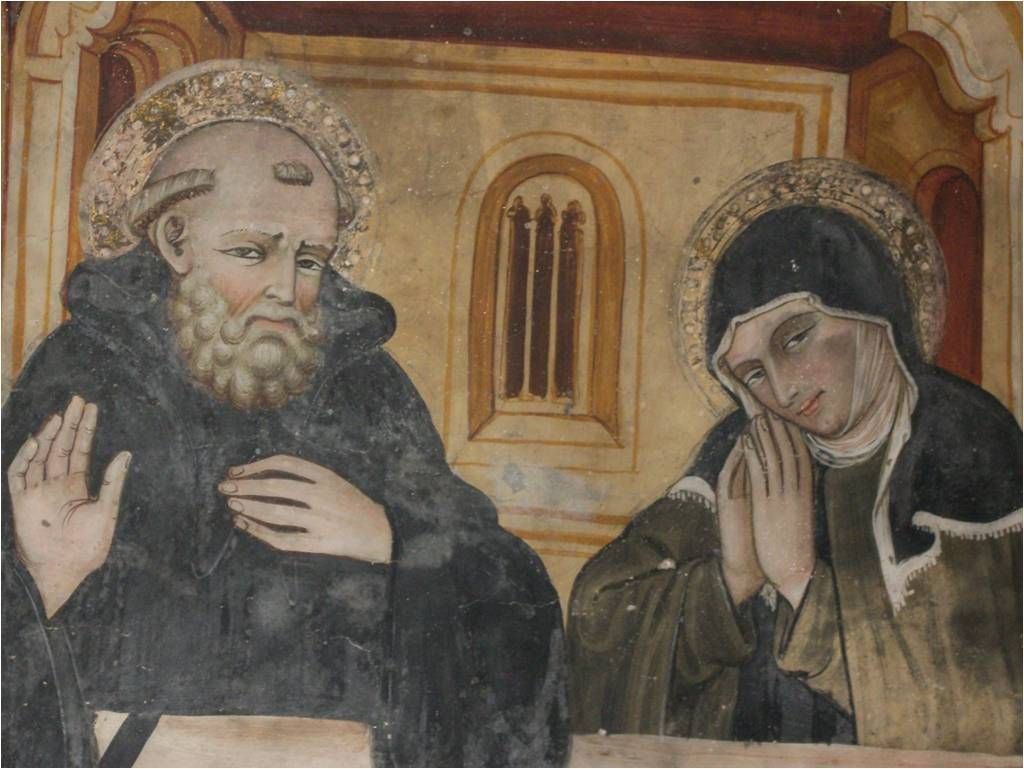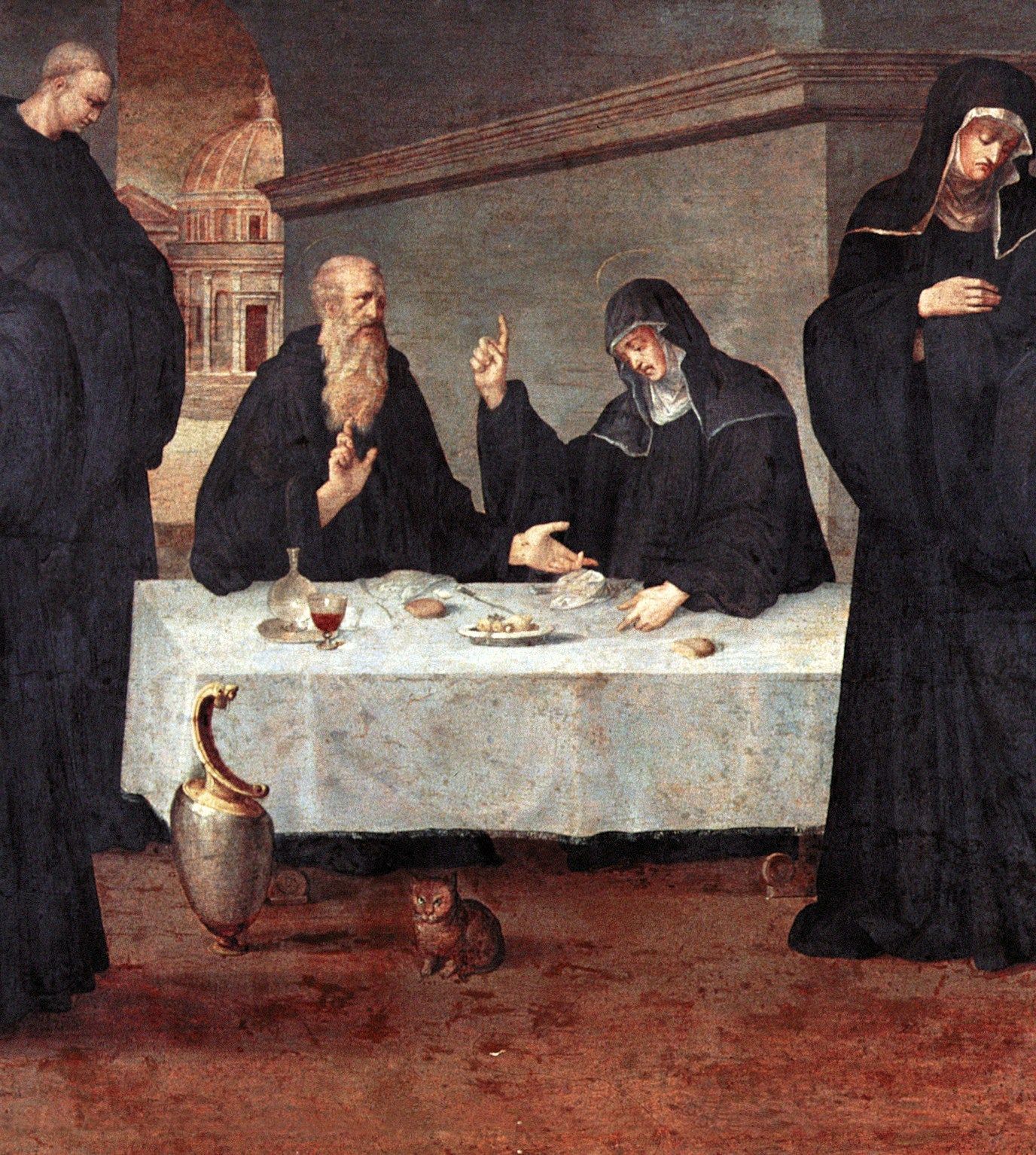Message of Abbot Paul - Saturday - 10th February 2024
Abbot Paul • February 9, 2024


Today the Church celebrates the feast of St Scholastica, who was St Benedict’s twin sister. Saints are usually remembered on the day that they are thought to have died. In Latin, this is always referred to as their Dies Natalitiae, which means their birthday, the day on which they were born to eternal life. This custom began in the early Church with the Christian martyrs. Her last days, her final meeting with her brother and the news of her departure from this world are related in detail in the Life of St Benedict, found in the Second Book of the Dialogues of St Gregory the Great. I have always suspected that Scholastica had a strong influence on the life and vocation of her brother. Did he follow her first to Subiaco and then to Monte Cassino? What influence did she have on that little rule for beginner monks that he wrote? Here and there you can see a woman’s hand, hear a woman’s voice and recognise her common sense. Perhaps not all monks would agree with me!
The Gospel reading for the feast comes from Luke, (Lk 10: 38-42), and is the account of a visit of Jesus to his friends Martha and Mary. You know the story well. “Jesus came to a village, and a woman named Martha welcomed him into her house. She had a sister called Mary, who sat down at the Lord’s feet and listened to him speaking. Now Martha who was distracted with all the serving said, ‘Lord, do you not care that my sister is leaving me to do the serving all by myself? Please tell her to help me.’ But the Lord answered: ‘Martha, Martha,’ he said ‘you worry and fret about so many things, and yet few are needed, indeed only one. It is Mary who has chosen the better part; it is not to be taken from her.’” John’s Gospel tells us that Jesus loved Martha and Mary and their brother Lazarus, who lived at Bethany. In Luke’s episode, Lazarus is not at home, just the two sisters. It’s probable that Jesus was not alone, but accompanied by his disciples. Martha must also have had help, but she was flustered, and there was Mary just sitting at the feet of Jesus, listening to his word, the one thing necessary. Martha was intent on feeding him, yet it was he who could feed her with the word of life. It must have been hard on Martha to hear Jesus say that Mary had chosen the better part, which was not to be taken from her. The daily bread of God’s word remains for ever in our hearts. Food, no matter how good and lovingly served, remains just a memory, if that. Of course, both the practical and the spiritual things of life are necessary, but there is a hierarchy of values, surely. This is an invitation to organise our lives in such a way that we have time for both. The art of hospitality begins with listening to our guests, giving them our time and an open ear as well as tending to their practical needs.
However, this story also helps us to understand the relationship between Benedict and Scholastica and the famous account of their final meeting shortly before her death, as told by St Gregory the Great in the Dialogues. Which of the two, do you think, chose the better part? The story follows here.
Scholastica, the sister of Saint Benedict, had been consecrated to God from her earliest years. She was accustomed to visiting her brother once a year. He would come down to meet her at a place on the monastery property, not far outside the gate.
One day she came as usual and her saintly brother went with some of his disciples; they spent the whole day praising God and talking of sacred things. As night fell, they had supper together.
Their spiritual conversation went on and the hour grew late. The holy nun said to her brother: “Please do not leave me tonight; let us go on until morning talking about the delights of the spiritual life.” “Sister,” he replied, “what are you saying? I simply cannot stay outside my cell.”
When she heard her brother refuse her request, the holy woman joined her hands on the table, laid her head on them and began to pray. As she raised her head from the table, there were such brilliant flashes of lightning, such great peals of thunder and such a heavy downpour of rain that neither Benedict nor his brethren could stir across the threshold of the place where they had been seated. Sadly, he began to complain: “May God forgive you, sister. What have you done?” “Well,” she answered, “I asked you and you would not listen; so I asked my God and he did listen. So now go off, if you can, leave me and return to your monastery.”
Reluctant as he was to stay of his own will, he remained against his will. So it came about that they stayed awake the whole night, engrossed in their conversation about the spiritual life.
It is not surprising that she was more effective than he, since as John says, God is love, it was absolutely right that she could do more, as she loved more.
Three days later, Benedict was in his cell. Looking up to the sky, he saw his sister’s soul leave her body in the form of a dove, and fly up to the secret places of heaven. Rejoicing in her great glory, he thanked almighty God with hymns and words of praise. He then sent his brethren to bring her body to the monastery and lay it in the tomb he had prepared for himself.
Their minds had always been united in God; their bodies were to share a common grave.









